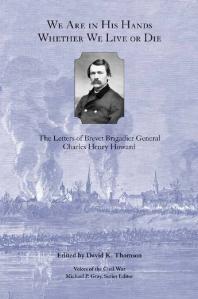(Ebook) We Are in His Hands Whether We Live or Die : The Letters of Brevet Brigadier General Charles Henry Howard by David K. Thomson ISBN 9781572339903, 157233990X
a a aMany soldiers who served in the American Civil War found solace in their faith during the mostatrying times of the war. But few soldiers took such a providential view of life and the CivilaWar as Charles Henry Howard. Born in a small town in Maine, Howard came from a familyawith a distinguished history of soldiering: his grandfather was a Revolutionary War veteranaand his brother, the older and more well-known Oliver Otis Howard, attended West Point andarose to command an army in the Civil War. Following in his brotherOCOs footsteps, Charles HenryaHoward graduated from Bowdoin College in 1859. Following graduation, Charles visited hisaolder brother at West Point during the tumultuous election of 1860. While at West Point, Howardasaw the tensions between Northern and Southern cadets escalate as he weighed his options for aamilitary or theological career. The choice was made for him on April 12, 1861, with the firing onaFort Sumter. a a aResponding to his brotherOCOs plea for the sons of Maine to join the Union cause, Charlesafound himself a noncommissioned officer fighting in the disastrous Battle of First Bull Run. Allatold, Howard fought in several major battles of the Eastern Theater, including Antietam, aFredericksburg, Chancellorsville, and Gettysburg, and went on to participate in various militaryaactions in the Western Theater including ShermanOCOs bloody Atlanta Campaign. He was woundedatwice, first at the Battle of Fair Oaks and again at Fredericksburg. Yet, despite facing the worstahorrors of war, Howard rarely wavered in his faith and rose steadily in rank throughout theaconflict. By warOCOs end, he was a brevet brigadier general in command of the 128th U.S. ColoredaTroop Regiment. a a aHowardOCOs letters cover a wide-ranging period, from 1852 to 1908. His concern for hisafamily is typical of a Civil War soldier, but his exceptionally firm reliance on divine providenceais what makes these letters an extraordinary window into the mind of a Civil War officer.aHowardOCOs grounded faith was often tested by the viciousness of war, and as a result his letters arearife with stirring confessions and his emotional grappling with the harsh realities he faced.aHowardOCOs letters expose the greater theological and metaphysical dilemmas of the war faced byaso many on both sides. David K. Thomson is completing his PhD at the University of Georgia. His research focusesaon the role of religion in the Civil War, in particular providential discourse and its impact onawartime efforts in finance, diplomacy, emancipation, politics, the home front, and the battlefield.
*Free conversion of into popular formats such as PDF, DOCX, DOC, AZW, EPUB, and MOBI after payment.


